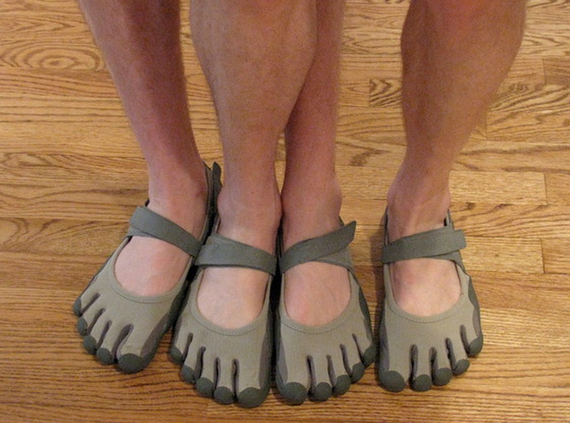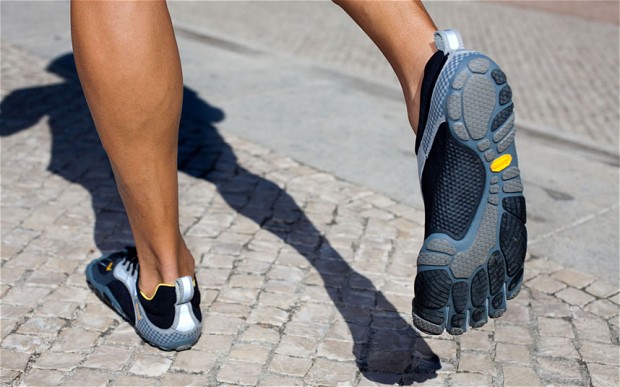Vibram FiveFinger Shoes Are Sole Full Of Lies... Or Not?
Vibram used deceptive marketing to falsely advertise the shoes as beneficial. In fact, none of their alleged benefits were based on scientific research.
Are you one of those many people who bought the funny-looking Vibram FiveFinger shoes, the ones with the individual toe-holders?
Well, there's some bad news (with a silver lining attached to it, though). Bad news: You were duped. The silver lining: You're entitled to a partial refund.
Vibram, the company that manufacturers FiveFinger shoes, settled a multi-year, class-action lawsuit brought by customers who were, to put it mildly, dubious of the company's claims that barefoot running shoes could improve health.
The shoe manufacturer will pay out as much as $3.75 million to anyone who purchased a pair of their finger-shoes since March 2009.
csmonitor.comThe terms of the settlement are twofold. First, Vibram has to pay out $3.75 million to customers who purchased Vibram FiveFingers after March 21, 2009. These customers will have to file a claim to receive the refund, and can submit for up to two pairs of shoes. The max refund is $94, though most claimants can expect to receive $20 to $50 per pair.
Vibram will have to dial back the health claims it's made for years about the benefits of running in its minimalist shoes, which are meant to mimic running barefoot
"Vibram will not make...any claims that FiveFingers footwear are effective in strengthening muscles or preventing injury unless that representation is true, non-misleading and is supported by competent and reliable scientific evidence," the federal settlement says. The reliable scientific evidence they require? For Vibram's barefoot shoes, it doesn't exist.
 vox.com
vox.com
Basically, Vibram deployed deceptive marketing and falsely advertised the benefits from wearing its shoe, without basing its claims on any scientific research:
Vibram USA chief executive Tony Post at the firm's Massachusetts headquarters
Image via bbcimg.co.uk(1) Strengthen muscles in the feet and lower legs
(2) Improve range of motion in the ankles, feet, and toes
(3) Stimulate neural function important to balance and agility
(4) Eliminate heel lift to align the spine and improve posture
(5) Allow the foot and body to move naturally
One thing Vibram doesn't have to do, however, is admit that they misled customers
In fact, the court brief reads, "Vibram expressly denied and continues to deny any wrongdoing alleged in the Actions, and neither admits nor concedes any actual or potential fault, wrongdoing or liability."
csmonitor.comSo, was Vibram at fault?
Vibram FiveFingers running shoes have serious devotees, and anecdotal evidence suggests that many wearers claim the shoes do have benefits over traditional running shoes. The science is fuzzy, though. Studies done in the past year found that minimalist shoes like FiveFingers might offer no benefit at all, or do more harm than good.
This contradicts earlier studies that found that barefoot running is beneficial, but only if you do it properly. The studies' sample sizes were too small to definitively end the debate, and likely, for Vibram to win in court.
csmonitor.comHowever, as James Fallows of The Atlantic argues, what the shoes are not, is "bullshit," which was the judgment of the snarkily hyperbolic Vox, with this headline:
If they're wrong for you, then wear something else! For its part, Vibram shouldn't claim they're right for everybody, reports James Fallows Of The Atlantic.
Vibram's FiveFingers running shoes became popular as part of the rise of barefoot running
Image via bbcimg.co.ukAnd—such are the wonders of the US legal system—if people actually bought these shoes for promised health benefits, then perhaps it's fair for them to get their $94-per-pair back. (What does this augur for the Belly Burner Weight Loss Belt? Or for Axe? You mean, thousands of bikinied women are not going to mass around any man who buys a can? Zounds!)
James Fallows further says, "again, if you're a heel-strike runner, as many people who learned in the era of fatly padded shoes are destined to be, these are not the footwear for you. But for people who run the way these shoes are designed for, or can learn, they're neither bullshit nor heinous but very good."




